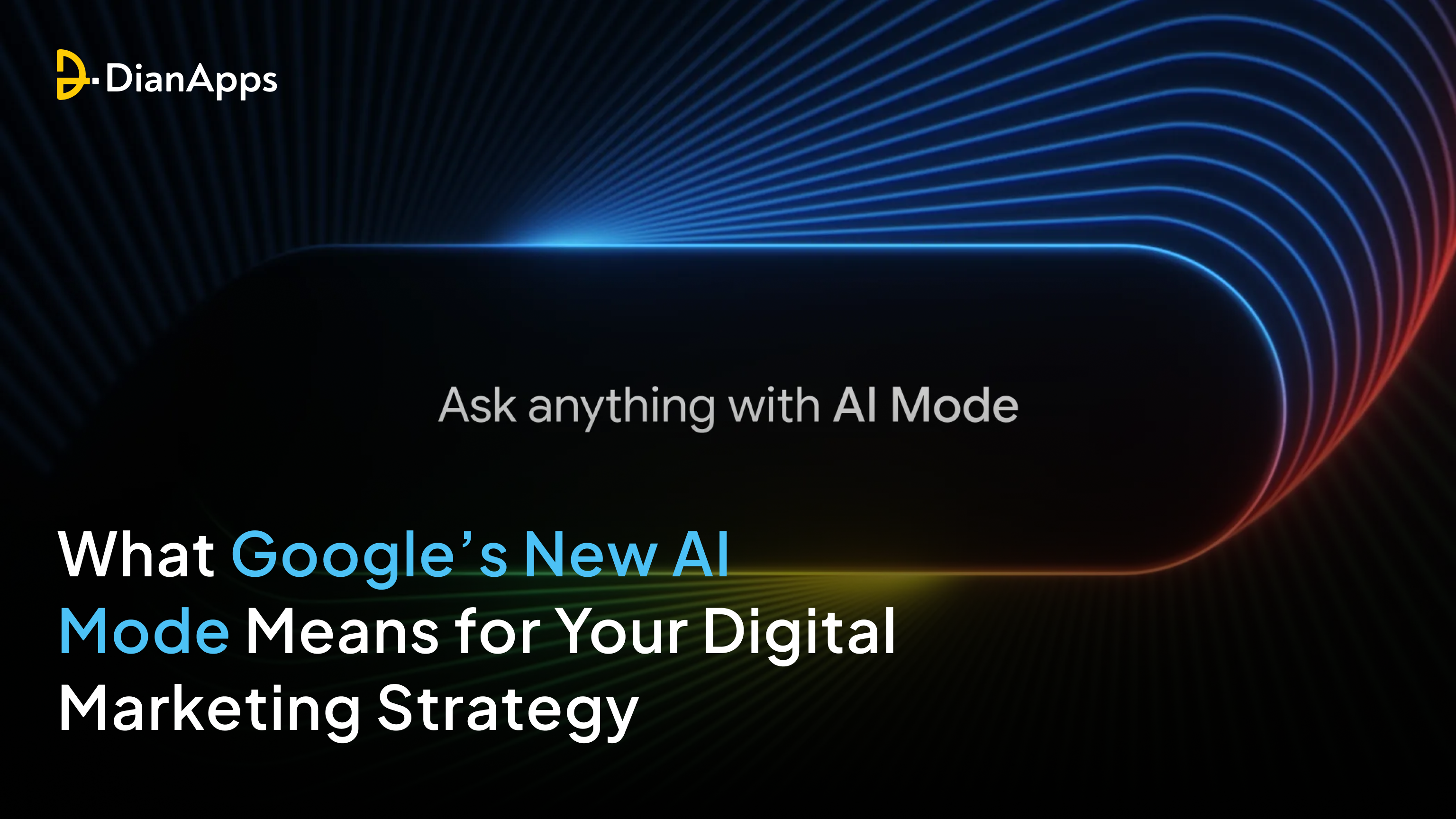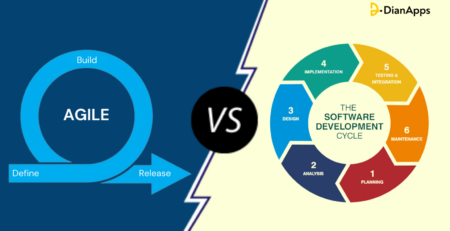What Google’s New AI Mode Means for Your Digital Marketing Strategy?
Search isn’t what it used to be.
We’ve officially entered a new era, one where typing keywords on Google search bars is no longer the full story. Instead of serving up a list of links, Google’s search is now powered by artificial intelligence, offering direct, conversational answers that often end the user’s journey right then and there.
This dramatic shift is being led by Google’s AI Mode, driven by its powerful Gemini models. This evolution has drastically changed how people find information, how content is surfaced, and most importantly, how businesses show up online.
If you are a digital marketer, content creator, SEO expert, or business owner, this evolution isn’t just interesting, but it has become a necessity. Because the rules of engagement, monetization, and visibility are all being rewritten.
In this blog, we’ll break down what Google’s AI Mode is, how it impacts SEO and advertising, and what you can do to stay relevant (and visible) in this AI-first world.
Let’s dive in.
What Is Google AI Mode and How Does It Work?

Google AI Mode can be termed as a bold step into the future of search. Google has now become more personalized, as instead of just showing you a list of websites based on keywords, it has now started using artificial intelligence to understand what you mean and provide you with a complete answer, right at the top of your search.
Consider it like another ChatGPT integrated into Google. Now, you can provide a detailed description of your questions, and it responds with clear, easy-to-understand information. Behind the scenes, it is quite similar to that of Gemini, Google’s advanced AI model that ensures it reads tons of information available on the web and provides the most relevant one. While it doesn’t provide you with the link to the content, it makes you feel like a conversation.
So, if you ask something like “Which is the best laptop under Rs 50,000 for video editing and college work?”, with AI mode, you don’t just get results of a few product pages. But it gives you a well-researched answer based on reviews, features, and comparisons, allowing you to make effortless decisions by reducing the time and effort of clicking through multiple sites.
The best part of AI mode is that it’s interactive, which allows you to ask follow-up questions or explore related topics without starting from scratch.
In simple words, Google AI mode is transforming how a search engine works, with the help of a tool that allows users to find answers to a tool that gives you straightforward answers.
Recommended Read: Top 6 AI Marketing Tools Better Than ChatGPT
How Google AI Mode is Changing SEO in 2025?
SEO no longer remains a concept that only focuses on ranking pages on the first page of a search engine. But now it has become more about being a part of the answer.
With Google AI Mode, search results are now shown with the help of an artificial intelligence that understands intent, context, and conversation. Instead of providing results based on keywords, Google now focuses on understanding user goals and delivering a detailed response using AI. This shows that even if your content is ranking well.
With Google AI Mode, search results are now generated by artificial intelligence that understands context, intent, and conversation. Instead of matching keywords, Google now aims to understand what a person truly wants and delivers a detailed response using AI. That means even if your content is ranking well, it might not be featured in the AI-generated summary unless it’s truly relevant and structured properly.
In 2025, this has changed how SEO works in big ways:
- Ranking isn’t everything anymore; what matters is whether your content is cited in the AI’s answer.
- Google prefers content that’s clear, structured, and trustworthy. Long-form fluff and keyword stuffing won’t cut it.
- Schema markup, bullet points, and FAQs make your content easier for AI to understand and use.
- Google also considers your expertise, author credentials, and how often your brand is mentioned online.
In short, SEO in 2025 is about making your content valuable, credible, and easy to understand for both users and AI. If your content is helpful and well-organized, Google’s AI is more likely to pick it up, and that’s how you win visibility now.
Recommended Read: 5 Ways SEO Can Make You More Successful in Today’s Digital Marketing
Advertising in Google AI Mode: What Marketers Need to Know
Google’s ad game is also getting a major makeover with AI Mode.
In the past, ads were clearly marked and appeared above or alongside search results. Now, with AI Mode generating rich, conversational answers, ads are starting to be blended into those AI responses—in a more subtle and context-aware way.
Here’s what’s new and important for marketers:
- Ads may now appear inside AI-generated answers, especially when they’re highly relevant to what the user is searching for. But they won’t show up for every query; Google is being cautious and selective.
- This means that ad quality matters more than ever. Google wants to serve ads that feel useful, not disruptive.
- Because AI Mode understands longer, more detailed queries, you can now target more specific intent, not just simple keywords.
- Metrics are also evolving. Clicks and impressions still matter, but now engagement, time spent, and user actions are becoming key signs of success.
What marketers should focus on now is creating ads that answer questions, solve problems, and feel natural within the flow of AI-generated content. If your brand shows up in a helpful way, users are more likely to trust it and convert.
In short, it’s no longer about shouting for attention. It’s about earning your place in the conversation.
Introducing Generative Engine Optimization with AI-Powered Search

(Source)
The way we optimize content for search engines is changing fast, and it’s all because of AI.
With Google’s AI Mode now summarizing search results instead of just showing links, the traditional SEO playbook isn’t enough. It’s not just about using the right keywords or getting backlinks anymore. To stay visible, brands need to focus on how AI reads and selects content.
This is where Generative Engine Optimization (GEO) comes in.
GEO is a newer approach that helps your content get picked up, understood, and cited by AI-generated answers. Instead of optimizing for search engine crawlers, GEO is all about making your content easy for AI to process and summarize.
Think of it like this: SEO helps you rank in search. GEO helps you appear inside the AI’s actual response.
Here’s a simple breakdown of how SEO and GEO differ:
| Aspect | Traditional SEO | Generative Engine Optimization (GEO) |
|---|---|---|
| Focus | Keywords, backlinks, and ranking | Clarity, context, and AI inclusion |
| Goal | Appear on Page 1 of the search results | Be cited in AI-generated answers |
| Optimization Style | For bots and ranking algorithms | For AI models and language understanding |
| Key Tactics | Keyword research, link building, and meta tags | Structured content, semantic relevance, and author authority |
| Main Success Metrics | Click-through rates and traffic volumes | Presence in AI answers and user trust |
| Format | Full articles, blogs, and landing pages | Snippets, bullet points, FAQs, summaries |
Why does GEO matter now?
Because AI Mode is starting to answer questions directly, your content needs to be the one it pulls from. That means writing with a clear structure, offering real insights, using proper schema markup, and showing genuine expertise.
If your content is clear, well-organized, and helpful, Google’s AI is more likely to use it. That’s how you move from just being found… to being trusted and referenced.
So, while SEO still matters, it’s time to start thinking one step ahead with GEO.
How to Make Your Content AI-Optimized and Citable by Google’s AI Mode
If you want your content to show up inside Google’s AI answers, not just on the search page, you’ll need to make it AI-friendly. It’s not about stuffing in keywords anymore. It’s about creating content that’s clear, structured, and helpful enough for Google’s AI to trust and cite.
Here are some simple tips to get started:
Use clear headings and subheadings
Break your content into sections using H1, H2, and H3 tags so AI can easily understand what each part is about.
Write short, straight-to-the-point paragraphs
Google’s AI pulls answers from content that’s easy to digest, so avoid big blocks of text.
Add bullet points and lists
These are great for summarizing information, and they’re easier for AI to extract and cite.
Use schema markup
Structured data like FAQ Pages, Articles, or How-to schema helps AI recognize the type and intent of your content.
Add expert quotes or original insights
AI prefers citing credible sources, so showing real expertise gives your content a better chance of being used.
Keep your content up-to-date
AI tools check for relevance. If your content is old or outdated, it’s less likely to be cited.
Include a TLDR or summary at the end
A short takeaway section can boost your chances of being featured in quick AI responses.
By following these steps, you’re not just optimizing for traditional search anymore — you’re building content that machines can trust, cite, and include right in their answers.
How DianApps Can Help You Adapt to Google’s AI-Powered Search
Adapting to Google’s AI Mode can feel like stepping into a whole new world of content and SEO, but you don’t have to do it alone.
At DianApps, we help businesses not only keep up with AI changes in search but also stay ahead of them. Here’s how:
We write content that’s AI-ready
Our team knows how to craft content with the structure, clarity, and insights that Google’s AI prefers to pull from.
We implement the right schema and formatting
From schema markup to clear headlines and lists, we make sure your website speaks the AI’s language.
We focus on both GEO and SEO
Our strategy includes both traditional search engine optimization and the newer Generative Engine Optimization (GEO), so you get the best of both worlds.
Our team understand intent, not just keywords
We create content that matches how users actually ask questions today, in a natural, conversational way that AI understands.
We monitor performance and adapt quickly
As Google’s AI Mode continues to evolve, we help you pivot with smart content updates and strategic improvements.
We partner with you to grow trust and authority
Whether it’s boosting your E-E-A-T signals or positioning your brand as a go-to source, we help you build the digital credibility that AI notices.
In a world where being visible now means being cited, DianApps is here to help your business stand out and stay relevant.
Final Words
Google’s AI Mode is not just another update; it’s a complete shift in how search works. From keywords to conversations, from rankings to citations, the rules have changed.
For businesses, content creators, and marketers, this is both a challenge and a big opportunity. To stay visible, your content needs to be clear, helpful, and easy for AI to understand and share.
Whether you’re rethinking your SEO strategy or starting fresh, now is the time to adapt.
At DianApps, we’re helping brands lead this shift through smarter content strategies and future-ready digital marketing services that go beyond just rankings and aim for real influence.
The future of search is here. Make sure your brand is part of the answer.




